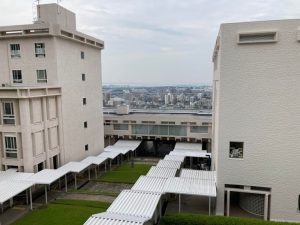Lecture at Konan Women’s University [Japan/HQ]
Located along the slope of the mountain skirt, these buildings at Konan Women’s University were designed by Architect Togo Murano in 1967 and are registered as a tangible cultural property. Their placement perfectly complements the modernity and beauty of Kobe city.

On 8th June, SEEDS Asia’s Executive Director, Mitsuko Otsuyama, was invited as a guest teacher for the “NPO (not-for-profit) Studies” course at Konan Women’s University. This marked the fourth time that Ms. Hiromi Yamamura, the course coordinator/lecturer and an active NPO worker at CS Kobe, had organized this opportunity.
During the lecture, the topic of “Making communities and individuals disaster-resilient: Understanding the reality that unprotected happiness will not last long” was discussed in three parts.
The first part focused on responding to Ms. Yamamura’s request to explore the reasons why Otsuyama is engaging in her work. Otsuyama shared her experiences of working with children who lost their parents in the Great Hanshin-Awaji Earthquake and encountering terrorist attacks in an Indian city where she worked. These experiences led her to realize that safety is not an inherent right and emphasized the importance of preparedness in reducing disaster risks.
The second part highlighted SEEDS Asia’s activities and their vision of a sustainable and disaster-resilient society. This emphasizes the necessity of disaster risk reduction that take into account sustainability, the natural environment, and people’s lives and cultures. Given the increasing severity and frequency of weather disturbances due to climate change, community building and capacity development are becoming increasingly important.
The final part focused on the global challenges of disaster risk reduction and engaged the students in discussing various perspectives. One of the conflicting scenarios examined was the use of disaster preventive technologies, which can appear effective but may also lead to the destruction of ecological diversity, traditions, landscapes, or exacerbate social inequality. It was emphasized that disaster risk reduction should always consider inclusiveness and long-term impacts to avoid creating new risks. This is the reason why NPOs should remain highly self- reflective and critical.
During the Q&A session, many questions were asked, and a comment that stood out was: “The phrase ‘unprotected happiness won’t last long’ particularly impressed me. I learned that disaster risk reduction is essential for building resilient communities, which in turn contributes to a sustainable society. Reaching out to marginalized communities that are often overlooked by other forms of support is something that NPOs can accomplish.”
We extend our sincere gratitude to Ms. Yamamura and her students for providing this wonderful opportunity.